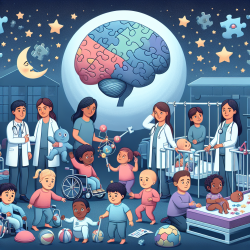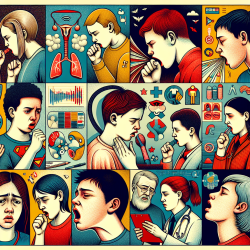In pediatric rehabilitation, addressing sleep disorders in children with neurodisabilities is crucial yet often overlooked. The research article "Sleep health practices and sleep knowledge among healthcare professionals in Dutch paediatric rehabilitation" by Hulst et al. (2020) provides insightful data on the current state of sleep health practices and knowledge among healthcare professionals (HCPs) in this field. This blog will delve into the key findings of this research and discuss how practitioners can implement these outcomes to improve their clinical skills and patient outcomes.
Key Findings from the Research
The study conducted a cross-sectional sleep survey among medical and non-medical HCPs and the general population, involving 30 rehabilitation physicians (RPs), 54 allied health professionals (AHPs), and 63 controls. The survey consisted of three domains: general information, application of sleep health practices, and sleep knowledge.
- RPs addressed sleep issues more frequently in clinical practice compared to AHPs.
- Sleep interventions mainly consisted of providing advice on healthy sleep practices.
- RPs scored highest on all knowledge domains, yet total sleep knowledge scores did not exceed 50% correct across all groups.
- Sleep hygiene rules closest to bedtime and related to the sleep environment were best known, whereas those related to daytime practices were rarely mentioned.
- A small minority of HCPs (RPs 20%; AHPs 15%) felt they possessed sufficient sleep knowledge to address sleep in clinical practice.
- No association was found between self-perceived knowledge and actual sleep knowledge scores among HCPs.
Implications for Practice
Given these findings, it is evident that there is a significant gap in sleep knowledge among HCPs working in pediatric rehabilitation. To bridge this gap, the following steps are recommended:
1. Incorporate Sleep Assessments into Routine Evaluations
Sleep should become a standard item for review during routine health assessments in pediatric rehabilitation settings. By routinely addressing sleep, HCPs can better identify and manage sleep disorders, which are prevalent in children with neurodisabilities.
2. Implement Sleep Training Programs
Appropriate sleep training programs should be implemented to empower HCPs with the necessary knowledge, skills, and confidence to recognize and treat sleep disorders. These programs should cover:
- Sleep physiology
- Common sleep disorders
- Sleep hygiene practices
- Intervention strategies
3. Educate Parents and Caregivers
HCPs should also focus on educating parents and caregivers about the importance of sleep and how to establish healthy sleep routines for their children. Providing practical advice and resources can help families create a conducive sleep environment and promote better sleep hygiene.
4. Encourage Further Research
Further research is needed to explore effective sleep interventions and to develop evidence-based guidelines for managing sleep disorders in children with neurodisabilities. Practitioners are encouraged to stay updated with the latest research and to contribute to this growing field.
Conclusion
The research by Hulst et al. (2020) highlights the critical need for improved sleep health practices and knowledge among HCPs in pediatric rehabilitation. By incorporating sleep assessments into routine evaluations, implementing comprehensive sleep training programs, educating parents, and encouraging further research, practitioners can significantly enhance the quality of care for children with neurodisabilities.
To read the original research paper, please follow this link: Sleep health practices and sleep knowledge among healthcare professionals in Dutch paediatric rehabilitation.










